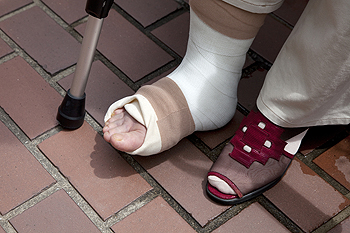 If you have suffered a traumatic ankle injury that may result in swelling, severe pain and bruising, you may have broken your ankle. Most broken ankles occur from a fall, which causes one or more of the ankle bones to fracture. Occasionally, if jumping from an extended height occurs, the joints may undergo extreme flexing, which may cause a broken ankle. It’s important to take all weight off the ankle as soon as possible, and this is typically accomplished by immobilizing the ankle in a cast. Research has shown that six weeks is the average time a cast is worn, which typically allows ample time for the ankle bone to heal. For severe breaks, surgery may be necessary to adequately repair the bone, which may include inserting metal pins or plates. It’s beneficial to begin a rehabilitation program when the cast is removed. This may ensure proper mobility. Please speak to a podiatrist if you have broken your ankle for additional information.
If you have suffered a traumatic ankle injury that may result in swelling, severe pain and bruising, you may have broken your ankle. Most broken ankles occur from a fall, which causes one or more of the ankle bones to fracture. Occasionally, if jumping from an extended height occurs, the joints may undergo extreme flexing, which may cause a broken ankle. It’s important to take all weight off the ankle as soon as possible, and this is typically accomplished by immobilizing the ankle in a cast. Research has shown that six weeks is the average time a cast is worn, which typically allows ample time for the ankle bone to heal. For severe breaks, surgery may be necessary to adequately repair the bone, which may include inserting metal pins or plates. It’s beneficial to begin a rehabilitation program when the cast is removed. This may ensure proper mobility. Please speak to a podiatrist if you have broken your ankle for additional information.
Broken ankles need immediate treatment. If you are seeking treatment, contact Dr. Rouder from S.I. Podiatry. Our doctor can provide the care you need to keep you pain-free and on your feet.
Broken Ankles
A broken ankle is experienced when a person fractures their tibia or fibula in the lower leg and ankle area. Both of these bones are attached at the bottom of the leg and combine to form what we know to be our ankle.
When a physician is referring to a break of the ankle, he or she is usually referring to a break in the area where the tibia and fibula are joined to create our ankle joint. Ankles are more prone to fractures because the ankle is an area that suffers a lot of pressure and stress. There are some obvious signs when a person experiences a fractured ankle, and the following symptoms may be present.
Symptoms of a Fractured Ankle
- Excessive pain when the area is touched or when any pressure is placed on the ankle
- Swelling around the area
- Bruising of the area
- Area appears to be deformed
If you suspect an ankle fracture, it is recommended to seek treatment as soon as possible. The sooner you have your podiatrist diagnose the fracture, the quicker you’ll be on the way towards recovery.
If you have any questions, please feel free to contact our office located in Staten Island, NY . We offer the newest diagnostic and treatment technologies for all your foot care needs.
